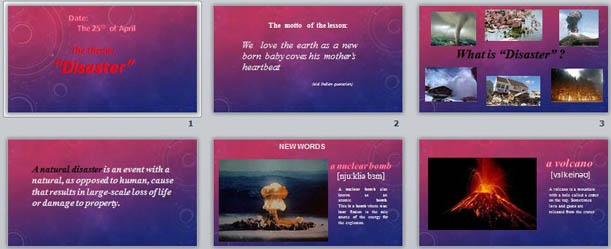The aims: I. Educational :
1. To explain the new grammar material on the theme ″Past Simple Passive ″
2. to teach to analyze and make conclusion and to understand oral speech.
II Developing:
1. To develop students’ skills and habits in monologue, dialogue speech through asking (answering)
2. To develop students’ speaking, listening and writing habits about nature and it’s protection
III Bringing up.
1. To bring up the felling of love wonder of environment natural world to respect and care of nature.
IV Practical
1. To be able to talk about different situations using Passive Voice words, and word combinations
Equipment: Interactive board, Multimedia board, tape recorder
Type of the lesson: Non traditional
Methods : Reading, translating, asking and answering questions.
Using technology: (Critical thinking, association)
Interaction: Geography

The process of the lesson
- Get ready for the lesson. Put your books, exercise books and diaries on the desk. Stand up!
- Good morning! Sit down, please.
- I am very glad to see you! Let me introduce myself my name is Assel Narigeykyzy
- Now, I want you to divide in groups.
The motto of the lesson:
New words:
- Today we will speak about disasters. But first you need some new words. There are six words that you must differentiate. Read their meanings and translate.
Reading: read the text about the flood
- You have read the text “Flooding in West Kazakhstan oblast” and now try to answer these questions.
1. Where was the flooding?
2. What can you say about this disaster?
3. Was the flooding in Zelenovskoye region?
Listening: Listen and use the words to complete the summary of the story.
647 rise worse – heavy damaged evacuating provided
The water level in the Ural River in West Kazakhstan to the evening of April 13 was ____ centimeters. The water level in flooded areas continues to _____. According to weather forecasts the situation will soon get___________ rains are expected in the region.
1, 622 houses have been _______ by the flood in total. 400 out of them are dachas (country cottages). The rescuers are currently _________ the people from the dangerous areas and are moving them to the evacuation centers. The evacuees are __________ with food and medical care. The total number of the people rescued from the flood affected areas makes more than _____ now, Kazinform refers to the press service of the Kazakh Emergencies Ministry.
The new grammar “Past Simple Passive”
Passive voice is used when the focus is on the action. It is not important or not known, however, who or what is performing the action.
Example: My bike was stolen.
In the example above, the focus is on the fact that my bike was stolen. I do not know, however, who did it.
Sometimes a statement in passive is more polite than active voice, as the following example shows:
Example: A mistake was made.
In this case, I focus on the fact that a mistake was made, but I do not blame anyone (e. g. You have made a mistake. ).
Form of Passive
Subject + finite form of to be + Past Participle (3rd column of irregular verbs)
Example: A letter was written.
When rewriting active sentences in passive voice, note the following:
the object of the active sentence becomes the subject of the passive sentence
the finite form of the verb is changed (to be + past participle)
the subject of the active sentence becomes the object of the passive sentence (or is dropped)
Rewrite the sentences in passive voice.
She sang a song. – A song was sung by her.
Somebody hit me. – I was hit.
We stopped the bus. – The bus was stopped by us.
A thief stole my car. – My car was stolen
They didn't let him go. – He wasn’t let go.
She didn't win the prize. –The prize wasn’t win.
They didn't make their beds. – The beds weren’t made.
I did not tell them. – They weren’t told.
Did you tell them? – Were they told?
Did he send the letter? – Was the letter send?
Conclusion:
- T. : What is an earthquake?
- P1. : I think that an earthquake is a sudden shaking of the ground.
- T. : What can you say about a hurricane?
- P2. : A hurricane is a very violent wind or storm.
- T. : What is a flood?
- P3. : A flood is a large amount of water which quickly covers a place that is usually dry land.
- T. : Try to explain the meaning of the word volcano?
- P4. : A volcano is a mountain with a hole called a crater in the top. Sometimes lava and gases are released from the crater.
- T. : What’s the Kazakh for “disaster”?
- P5. : The Kazakh for “disaster” is “апат”.
Home task
Giving marks
T: - Thank you very much. Well done!
Your marks are…
The bell has gone. The lesson is over. You are free. Thank you. Good - bye.

 Получите свидетельство
Получите свидетельство Вход
Вход




































 Презентация по английскому языку "Disaster" (7.68 MB)
Презентация по английскому языку "Disaster" (7.68 MB)
 0
0 1358
1358 140
140 Нравится
0
Нравится
0






